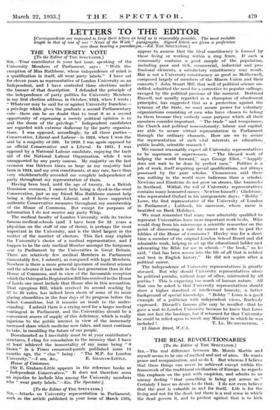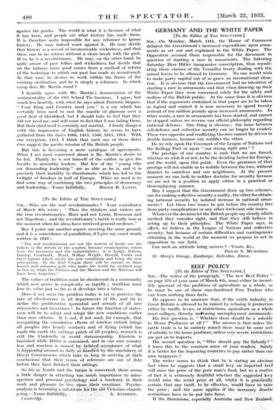THE REAL REVOLUTIONARIES
• . [To ,the Editor of THE SPECTATOR.] SIR,—The real difference between Mr. Morris Martin and myself seems to be one of method and not of aims. He wants peace and reorganization, and so do L But Whereas I believe that these things can never be achieved except within the • framework of the traditional civilization of Europe; he regards this emphasis 'on the past with suspicion, and admits to an - uneasy feeling " " that something is being put across us." Certainly I have no desire to do that. I do not even believe that the past is valuable in and for itself. Life is for the living and not for the dead, but there is -a real sense in which the dead govern it, and to protest against that is to kick against the pricks. The world is what it is because of what it has been, and people are what history has made them. It is therefore quite impossible for any reformer to ignore history. He may indeed react against it. He may decide that history is a record of inconceivable wickedness, and that there can be no reform without a clean break with the past. If so, he is a revolutionary. He may, on the other hand, be quite aware of past follies and wickedness but decide that on the balance more good comes from a method of reform of the technique to which our past has made us accustomed. In that case, he desires to work within the frame of the existing civilization, and he is simply a reformer. In which camp does Mr. Martin stand ?
I heartily agree with Mr. Martin's denunciation of the sentimentality of the Old School Tie business. I agree, but Much less heartily, with what he says about Patriotic Slogans. " Your King and Country need you " is a cry which has certainly been used to cast the mantle of glamour over a good deal of bloodshed, but I should hate to feel that they did not need me, and still more to feel that I was failing them. But their chief need is certainly not martial. I firmly disagn e with the impression of English history he seems to have gathered from the dates 1066, 1415, 1588, 1815, 1914. With one exception, 1415, I think that each one of these dates does suggest the pacific mission of the British people.
But this is becoming a mere catalogue of agreements. What I am most concerned about is Mr. Martin's desire to be led. Plainly he is not himself of the calibre to give his loyalty to unworthy leaders. But few of the " young who are demanding leadership " are as able as he is, and it is precisely their inability to discriminate which has led to the twilight of freedom in half of Europe. What we need is to find some way of combining the two principles of democracy





























































 Previous page
Previous page